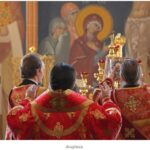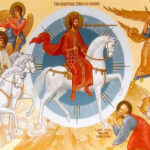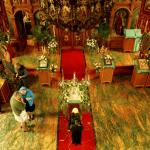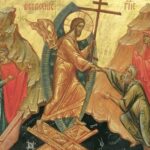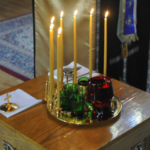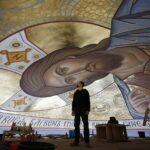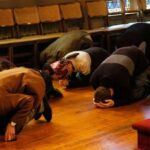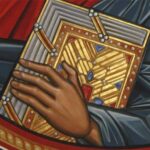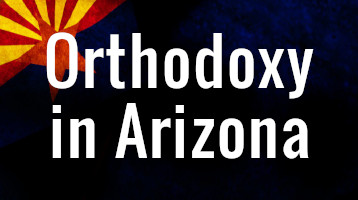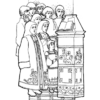Sermon 21 by St. Seraphim (Zvezdenski) Translated by Fr. Zachariah Lynch Below the reader will find my translation from the Russian of sermon number 21 by St. Seraphim (Zvezdenski), On the Divine Liturgy (only one more to go!). St. Seraphim reveals, once again, to us that the Divine Liturgy is a direct window to the Sun of Righteousness. Through it, the world is sustained and upheld. Is it any wonder, therefore, that the enemy seeks to halt the service of the Divine Liturgy? Be it through outright hindrance or by replacing it with an anti-liturgy, a false liturgy (such as is performed, for example, by the pseudo-church in Ukraine, the “orthodox church of Ukraine” [OCU-EP]). We also see … [Read more...]
Christ’s 2nd Coming or Antichrist: Who are Modern Christians Waiting For?
by Professor Alexei Osipov A lecture given to students of the Moscow Theological Academy Who is more awaited by modern Christians: Christ with His spiritual blessings, but Who has not improved people’s earthly life a whit, has not solved their daily problems—political, economic, social, or cultural; or antichrist, who promises to do give all this? Those Christians of all confessions, who see the meaning of their lives and faith itself in receiving the maximum of earthly blessings, will, of course, receive this earthly king as their savior. You don’t believe it? Well, just look at what modern Christians around the world seek most of all—of course they seek an abundance of earthly … [Read more...]
Why Do We Decorate Churches with Grass, Flowers and Tree Branches on Pentecost?
by Archpriest Boris Stark It symbolizes the soul, which blossoms and turns green after its winter sleep because the grace of God has touched it. Since ancient times, there is a pious tradition to decorate churches on the day of Pentecost with greenery – leaves, flowers, birch branches and so on. What is the origin of this tradition? Many people ask this question. I think there are two reasons for it: the first reason is church-historical, while the second one is symbolic. From the historical viewpoint, I believe, this branches remind us about the Mamre oak-wood: there was the oak under which the Lord, the Holy Trinity, appeared to Abraham in the shape of three angels.* We can see this … [Read more...]
Christianity without Pentecost
by Fr. Josiah Trenham In this sermon, Fr. Josiah presents an intriguing idea: What happens if Christians experience Ascension, but do not experience Pentecost. In the Name of the Father, and of the Son, and of the Holy Spirit, One God. Amen. The last ten days in the Church have been unusual. In some sense we have been living between two realities. On the leave-taking of Pascha we ceased the sustained celebration of the Holy Resurrection of the Lord as well as our saying, “Christ is risen. Truly He is risen.” The next day we celebrated the Glorious Ascension of our Savior into the heavens to sit at the right hand of the Father. For these days between Ascension and Pentecost we have … [Read more...]
Freedom and Pentecost
What has Pentecost to do with freedom? What is freedom exactly? What is it not? by Fr. Patrick Henry Reardon When we declare that God created the Cosmos in freedom, we mean that nothing outside of God had to be. Modern philosophers seriously ask—as other philosophers, for centuries, implied—why is there something instead of nothing? This sane and sensible question rests on the plain insight that nothing we see in the Universe really has to be. And if nothing in the Universe has to be, then the Universe itself does not have to be. So, then, why does it exist, since there appears to be no necessity that it should exist? The biblical doctrine of Creation, to which the Church is committed by … [Read more...]
The Leavetaking of Pascha
The Apodosis (Leavetaking) of Pascha is celebrated on Wednesday of the sixth week after Pascha. On this day ends the forty-day celebration of the Bright Resurrection of Christ. For the last time we greet each other with the words of Paschal joy, “Christ is Risen!” and prepare ourselves to greet the upcoming feast of the Lord’s Ascension. The Apodosis of Pascha. History The last day of the afterfeast of great feasts such as Pascha, or of the Twelve Great Feasts, is called the “Apodosis”. These days have their own distinguishing liturgical features. From Church history we know that the leavetaking of the main Christian feasts, such as Pascha, the Nativity, and Pentecost, were honored as far … [Read more...]
“Why do we not do the Unction Service on Holy Wednesday?”
Originally entitled "Stump the Priest: General Unction and Holy Week" by Fr. John Whiteford The common practice among Greeks, Antiochians, and in some other parishes, of doing General Unction on the evening of Holy Wednesday is not an ancient practice. There is no mention of doing this service on that day in the Typikon, or in the Triodion. The Unction service makes no mention of Holy Week, and so stands completely outside of the liturgical cycle of Holy Week. There is a service that is appointed to be done on Holy Wednesday evening and that is the Matins of Holy Thursday, which is what we do in our parish. This service commemorates the institution of the Eucharist, the Mystical Supper, … [Read more...]
Venerating Icons – It’s So Much Other Than You Think
by Fr. Stephen Freeman In 1991, I sat in a room at Duke University with Geoffrey Wainwright, Stanely Hauerwas, and Susan O’Keefe. The purpose was the defense of my thesis, “The Icon as Theology.” I was an Episcopal priest, who was turning his doctoral work in Systematic Theology into an M.A. and heading back to parish life (a long story, that). The defense was friendly, thorough, with few surprises. The one major surprise, of course, came from Hauerwas. His question caught me off-guard in that it left behind academic questions and became intensely personal (that’s typical Hauerwas – there are no hiding places). His question was straight-forward: “Do you believe the veneration of icons to … [Read more...]
The Great Canon of St. Andrew of Crete: An Explanation
The Great Canon of St Andrew, Bishop of Crete, is the longest canon in all of our services, and is associated with Great Lent, since the only times it is appointed to be read in church are the first four nights of Great Lent (Clean Monday through Clean Thursday, at Great Compline, when it is serialized) and at Matins for Thursday of the fifth week of Great Lent, when it is read in its entirety (in this latter service, the entire life of St Mary of Egypt is also read). There is no other sacred hymn which compares with this monumental work, which St Andrew wrote for his personal meditations. Nothing else has its extensive typology and mystical explanations of the scripture, from both the Old … [Read more...]
The Key to Understanding the Bible Contextually
by Abbot Tryphon The Bible can only be understood through the Church, for the Holy Scriptures came forth from the Church. The reformers dumped the papacy only to replace that institution with themselves as the ultimate authority. Since reason and logic ruled, there was no room for the intuitive, noetic nature of the heart. Thus the interpretation of the Bible became a debatable subject between believers, ending in new denominations proliferating like rabbits. The Bible is the written account of the first Christians experience with God and was a living, oral tradition inspired by the Holy Spirit, and put down in written form. To think that it is therefore open to personal interpretation, … [Read more...]
- « Previous Page
- 1
- 2
- 3
- 4
- …
- 9
- Next Page »
